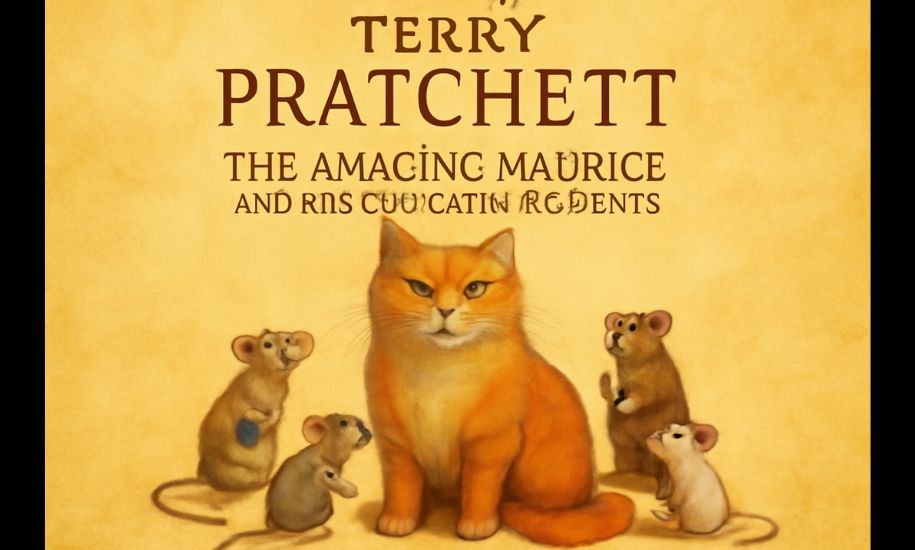Terry Pratchett is widely known for his sharp wit, memorable characters, and his ability to blend complex themes with humor, and his novel The Amazing Maurice and His Educated Rodents is a shining example of these qualities. Originally published in 2001, The Amazing Maurice and His Educated Rodents is the first book in the Discworld series aimed at a younger audience, and it takes the reader on a wild, imaginative adventure filled with talking cats, intelligent rats, and human companions with unique personalities. The novel, which departs from Pratchett’s usual adult-focused themes, has earned critical acclaim and a special place in the hearts of fans young and old alike.
This article delves into the various aspects of The Amazing Maurice and His Educated Rodents, from its plot and characters to its themes and critical reception. It is a celebration of Pratchett’s storytelling genius and his ability to weave together fantasy, humor, and deep moral reflections.
A Fresh Take on an Old Legend: The Plot of The Amazing Maurice and His Educated Rodents
At the heart of The Amazing Maurice and His Educated Rodents is a satirical retelling of the classic Pied Piper of Hamelin legend, though with a twist that only Terry Pratchett could pull off. Maurice, the clever and streetwise cat, teams up with a group of sentient rats who, thanks to a magical accident, have developed intelligence and self-awareness. The group also includes a human boy named Keith, who, like Maurice and the rats, has become part of their scam—a scam where they infest towns with rats, then come to the rescue by “clearing” the town for a fee.
Their exploits bring them to the town of Bad Blintz, where they encounter something unexpected: a much darker and more sinister plot. Here, the rats are being bred not as part of a simple infestation but as part of an evil scheme involving a cruel rat-catcher who has discovered the secret to creating highly intelligent rats for his own nefarious purposes. As Maurice and his gang uncover the mystery, they find themselves in the midst of a battle against evil, not just for survival, but also for their own identities.
The plot combines elements of mystery, adventure, and dark comedy, all while maintaining the fantastical qualities of the Discworld universe. The narrative moves briskly from one revelation to another, keeping readers engaged and invested in the fate of Maurice, his educated rodents, and the townspeople they encounter.
Themes: Morality, Identity, and the Nature of Intelligence
What truly elevates The Amazing Maurice and His Educated Rodents above a simple children’s adventure novel are the profound themes it explores. The rats in the story are not just intelligent creatures—they are grappling with the very concept of what it means to be human. They ask deep questions about their place in the world and whether they are any different from the humans who treat them as pests. This raises important philosophical questions about the nature of intelligence and consciousness.
Pratchett uses these themes to comment on society, highlighting how people often define others by their usefulness or by their perceived “inferiority,” rather than recognizing them as individuals in their own right. Maurice, the cat, too must confront his own identity as a creature who was once a stray, living a life defined by instinct and survival, and now must decide what kind of character he wants to be.
In addition to these existential musings, Pratchett also examines issues of morality and right versus wrong. The rats, for example, initially deceive others for their own gain, but as they realize the harm they are causing, they must choose whether to continue their life of fraud or to become something better. This exploration of good versus evil, and the gray areas in between, gives the story emotional depth and resonance.
Pratchett’s Signature Style: Humor, Satire, and Wordplay
One of the hallmarks of Terry Pratchett’s writing is his deft use of humor, and The Amazing Maurice and His Educated Rodents is no exception. Through the adventures of Maurice and his gang, Pratchett delivers his characteristic blend of clever wordplay, sharp social commentary, and satirical humor. From Maurice’s witty one-liners to the rats’ musings on their newfound intelligence, the novel is brimming with laughs, both silly and thoughtful.
But the humor also serves a deeper purpose. Through satire, Pratchett critiques various aspects of society, including class dynamics, power structures, and the absurdity of human behavior. The book cleverly mirrors the world we live in, all while making readers laugh at the same time. It is this unique blend of humor and intelligence that has made Pratchett’s works so beloved.
Critical Reception: A Modern Classic
Since its publication, The Amazing Maurice and His Educated Rodents has been met with critical acclaim. It won the Carnegie Medal, one of the most prestigious awards in children’s literature, and was praised for its rich characters and thought-provoking themes. Reviewers from various literary outlets have celebrated Pratchett’s ability to blend the fantastical with the real world in such a seamless and entertaining way.
Publishers Weekly described the book as “hilarious” and highlighted the memorable characters, while Kirkus Reviews lauded its satirical take on the Pied Piper legend. The novel’s appeal has extended beyond younger readers, with adult fans of the Discworld series also enjoying its humor, wisdom, and depth.
The novel’s success also led to a 2022 animated film adaptation, which introduced the story to a new generation of fans. The film was well-received, with many praising its charm and fidelity to the original novel.
Conclusion: Terry Pratchett The Amazing Maurice And His Educated Rodents
Terry Pratchett The Amazing Maurice And His Educated Rodents is a novel that transcends its classification as a children’s book. It is a beautifully written and deeply thoughtful story that explores universal themes through the lens of humor and fantasy. Maurice and his band of educated rodents may be fictional characters, but the questions they raise about identity, morality, and intelligence are ones we all grapple with.
For readers seeking a fun, yet meaningful adventure, The Amazing Maurice and His Educated Rodents is a must-read. Its combination of humor, fantasy, and moral reflection makes it a timeless classic, appealing to audiences of all ages. Whether you’re a long-time Discworld fan or a newcomer to Pratchett’s work, this novel will leave you laughing, thinking, and maybe even looking at the world a little differently.
As a fan of Terry Pratchett and his witty, insightful storytelling, I highly recommend The Amazing Maurice and His Educated Rodents to anyone who loves literature that entertains and educates in equal measure. For more reviews, insights, and discussions on books like this, check out my blog, Digital Zine.


